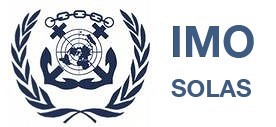SAFETY OF LIFE AT SEA

IMO – THE INTERNATIONAL MARITIME ORGANIZATION
IMO – is the United Nations specialized agency with responsibility for the safety of life at sea, security of shipping and the prevention of marine pollution by ships.
As a specialized agency of the United Nations, IMO is the global standard-setting authority for the safety, security and environmental performance of international shipping. Its main role is to create a regulatory framework for the shipping industry that is fair and effective, universally adopted and universally implemented.

IMO - SOLAS CONVENTION
The SOLAS Convention is generally regarded as the most important of all international treaties concerning the safety of merchant ships.
The main objective of the SOLAS Convention is to specify minimum standards for construction, equipment and operation of ships, compatible with their safety.
Flag States are responsible for ensuring that ships under their flag comply with its requirements, and a number of certificates are prescribed in the Convention as proof that this has been done. Control provisions also allow Contracting Governments to inspect ships of other Contracting States if there are clear grounds for believing that the ship and its equipment do not substantially comply with the requirements of the Convention - this procedure is known as Port State Control.
The current SOLAS Convention includes Articles setting out general obligations, amendment procedure and so on, followed by an Annex divided into 12 Chapters.
Chapter IV “Radio Communication” and chapter V “Safety of Navigation” are the two most relevant chapters for Danphone.
SOLAS CHAPTER IV - Radio Communications
This Chapter incorporates requirements for radio communication in sea areas Al, A2, A3 and A4 and the Global Maritime Distress and Safety System (GMDSS). It contains requirements for VHF, MF, HF with Digital Selective Calling (DSC), INMARSAT and the maritime safety information service, NAVTEX.
Read more about Danphone's GMDSS Radio System HERE.
All passenger ships and cargo ships of 300 gross tonnage and upwards on international voyages are required to carry equipment designed to improve the chances of rescue following an accident, including satellite emergency position indicating radio beacons (EPIRBs) and search and rescue transponders (SARTs) for the location of the ship or survival craft.
Regulations in Chapter IV cover undertakings by contracting governments to provide radio communication services as well as ship requirements for carriage of radio communication equipment. The Chapter is closely linked to the Radio Regulations of the International Telecommunication Union.
SOLAS CHAPTER V – Safety of Navigation
Chapter V identifies certain navigation safety services, which should be provided by Contracting Governments and sets forth provisions of an operational nature applicable in general to all ships on all voyages. This is in contrast to the Convention as a whole, which only applies to certain classes of ship engaged on international voyages.
The subjects covered include the maintenance of meteorological services for ships; the ice patrol service; routeing of ships; and the maintenance of search and rescue services.
Chapter V also includes a general obligation for masters to proceed to the assistance of those in distress and for Contracting Governments to ensure that all ships shall be sufficiently and efficiently manned from a safety point of view.
The chapter makes mandatory the carriage of voyage data recorders and Automatic Identification Systems (AIS).